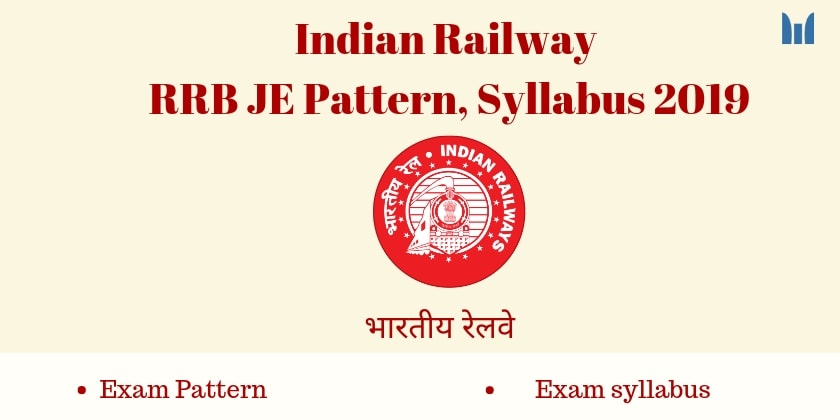Vacancies for RRB JE Junior Engineer
Registration started for RRB JE(Junior Engineer) has begun from 2 January 2019 and will continue till 31st January 2019. Examinations are conducted to select candidates for the posts of Junior Engineer (JE), Junior Engineer IT (JE IT), Depot Material Superintendent (DMS), and Chemical and Metallurgical Assistant (CMA) in Indian Railways. Here we discuss the RRB JE 2019 Exam Pattern & Syllabus.
RRB Junior Engineer Exam Pattern:
The entire recruitment process of RRB JE 2019 was conducted in four stage
- 1st stage Computer Based Test(CBT)- 90 Min/ 100 Questions
- 2nd stage Computer Based Test(CBT)- 120 Min/150 Questions
- Document Verification
- Medical Examination
1. 1st stage Computer Based Test(CBT):
| Subjects | No. Of Questions | Marks | Duration | |
|---|---|---|---|---|
| 1 | Mathematics | 30 | 30 |
1 hour 30 minutes (2 Hours for PHC Candidates) |
| 2 | General Intelligence and Reasoning | 25 | 25 | |
| 3 | General Awareness | 15 | 15 | |
| 4 | General Science | 30 | 30 | |
| 100 | 100 |
There will be negative marking for incorrect answers in CBT. For each question, 1 / 3rd of the allotted points will be cut for each wrong answer.
2. 2nd stage Computer Based Test(CBT):
Candidates who were clear 1st Stage CBT Exam were shortlisted for the 2nd Stage CBT exam. The total number of candidates selected for the 2nd stage will be 15 times the number of candidates for the posts notified against RRB according to their qualification in one-step CBT.
| Subjects | No. Of Questions | Marks | Duration | |
|---|---|---|---|---|
| 1 | General Awareness | 15 | 15 |
2 Hours (2 Hours 40 Minutes for PhC Candidates) |
| 2 | Physics & Chemistry | 15 | 15 | |
| 3 | Basics of Computers and Applications | 10 | 10 | |
| 4 | Basics of Environment and Pollution Control | 10 | 10 | |
| 5 | Technical Abilities | 100 | 100 | |
| 150 | 150 |
There will be negative marking for incorrect answers in CBT. For each question, 1 / 3rd of the allotted points will be cut for each wrong answer.
RRB Junior Engineer exam syllabus:
1. Syllabus for 1st stage Computer Based Test(CBT):
- Mathematics(30Marks): Number systems, BODMAS, Decimals, Fractions, LCM and HCF, Ratio and Proportion, Percentages, Mensuration, Time and Work, Time and Distance, Simple and Compound Interest, Profit and Loss, Algebra, Geometry, Trigonometry, Elementary Statistics, Square Root, Age Calculations, Calendar & Clock, Pipes & Cistern.
- General Intelligence and Reasoning(25 Marks): Analogies, Alphabetical and Number Series, Coding and Decoding, Mathematical operations, Relationships, Syllogism, Jumbling, Venn Diagram, Data Interpretation and Sufficiency, Conclusions and Decision Making, Similarities and Differences, Analytical reasoning, Classification, Directions, Statement – Arguments and Assumptions etc.
- General Awareness(15 Marks): Knowledge of Current affairs, Indian geography, culture and history of India including freedom struggle, Indian Polity and Constitution, Indian Economy, Environmental issues concerning India and the World, Sports, General scientific and technological developments, etc.
- General Science(30 Marks): Physics, Chemistry and Life Sciences (up to 10th Standard NCERT, CBSE).
2. Syllabus for 2nd stage Computer Based Test(CBT):
- Physics and Chemistry(15 Marks): Physics and Chemistry up to 10th Standard.
- General Awareness(15 Marks): Current affairs, Indian geography, culture and history of India including freedom struggle, Indian Polity and constitution, Indian Economy, Environmental issues concerning India and the World, Sports, General scientific and technological developments etc.
- Computers and Applications(10 Marks): Architecture of Computers; input and Output devices; Storage devices, Networking, Operating System like Windows, Unix, Linux; MS Office; Various data representation; Internet and Email; Websites & Web Browsers; Computer Virus.
- Environment and Pollution Control(10 Marks): Basics of Environment; Adverse effect of environmental pollution and control strategies; Air, water and Noise pollution, their effect and control; Waste Management, Global warming; Acid rain; Ozone depletion.
- Technical Abilities(100 Marks): The educational qualifications mentioned against each post shown in Annexure-A, have been grouped into different exam groups as below. Questions on the Technical abilities will be framed in the syllabus defined for various Exam Groups given at Annexure-VII-A, B, C, D, E, F & G.
- A-Civil & Allied Engineering-JE: Estimating, Costing, General Civil Engineering, Construction or Structure Engineering and Drawing, Valuation, Soil Mechanics, Structural Analysis, Building Materials, Mechanics, Concrete Structures, Steel Structures, Construction, Water Requirements, Hydraulics, Hydrology, Highway Planning, Traffic Engineering, Projections, Errors and Adjustments, Environmental Engineering, Surveying, Coordinate System, Curves, Measurements of distance and directions.
- B-Electrical & Allied Engineering-JE: Machines, Electrical and Electronic Measurements, Basics of Circuit and Power Electronics, Analog and Digital Electronics, Signals and Systems, Power and Control Systems, Circuits and Measurement Systems.
- C-Electronics & Allied Engineering-JE: Electronic Devices, Wireless Communication, Energy Bands Signal and Systems, Carrier Transport in Silicon: Diffusion current, Drift current, Mobility, and Resistivity, Generation and recombination of carriers, Tunnel, Control System, Junctions, Diodes, EMFT, Analog and Digital Circuits, Communication, Basics of Signal and Systems.
- D-Mechanical & Allied Engineering-JE: Strength of Materials, Fluid Mechanics, Heat Transfer, Theory of Machines, Kinematics of Machine, Engineering Mechanics, Machining and Machine Tool Operations, Thermodynamics, Power Engineering, I.C. Engine Cycles, Casting, Stream Tables, Thermodynamics cycles, Metrology and Inspection.
- E-Computer Science and Information Technology-JE: Languages, Computer Fundamentals, MS Office, Information Systems, Software Engineering, DBMS, Operating Systems, Computer Networks, Web Technology and Programming, Network Communication, Database, Algorithms, System Programming.
- F-Printing Technology-JE: Mathematics and Science including Physics, Chemistry, Environment and Pollution Control, Printing Techniques, Printing Materials, Paper and Ink Technology, Digital Technology and Imaging, Control Application in Printing, Printing Surface Preparation, Offset Printing, Colour Science, Flexo and Gravure, Newspaper Printing, Basic Concepts of Computers.
- G-Chemical & Metallurgical Assistant (CMA): Basic concepts of Fuel, Thermodynamics, Applied Chemistry, Material Science, Instrumentation and Measurement, Polymers, Computers, Environment and Pollution Control.
Read also


SIR SYLLABUS HI DOGE YA PAPER V
you will get a previous years papers and model papers also …